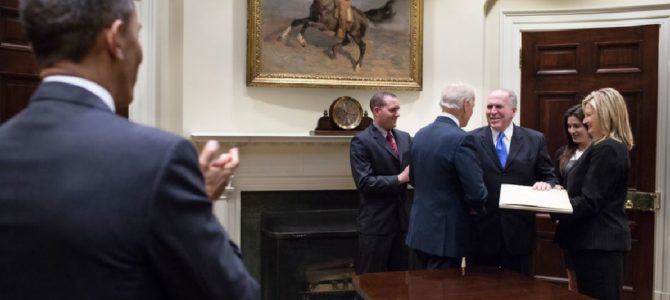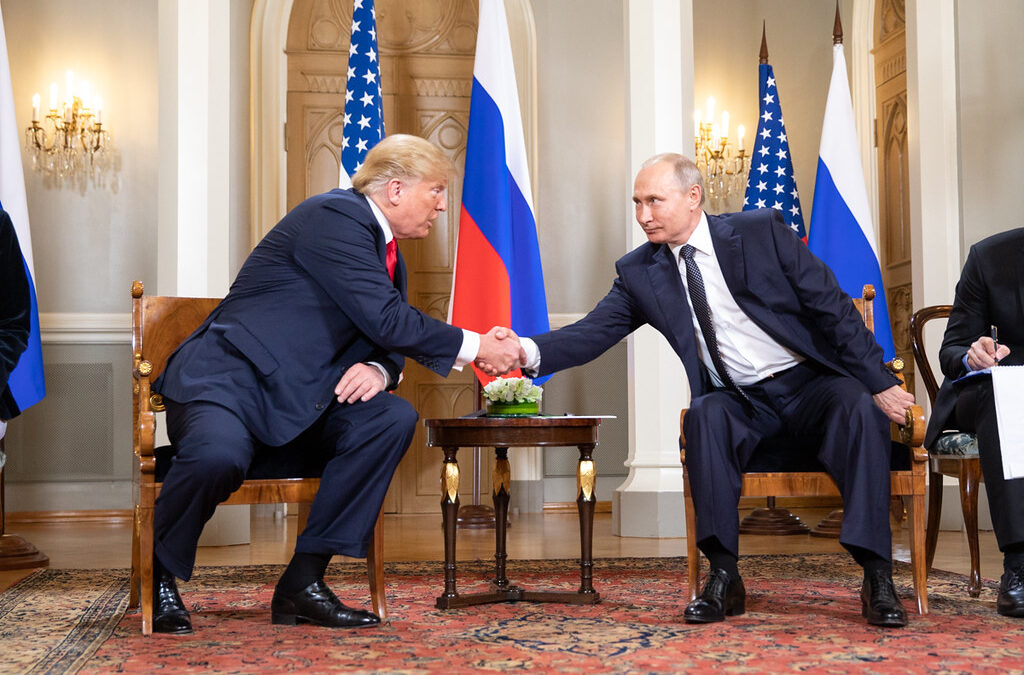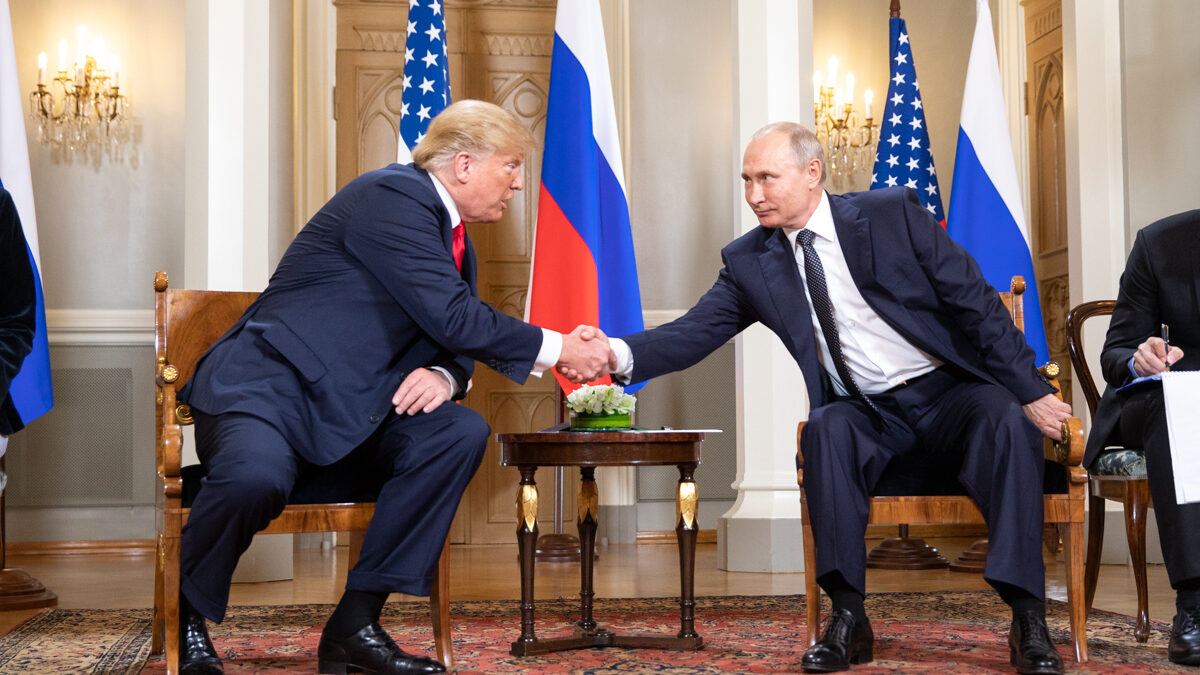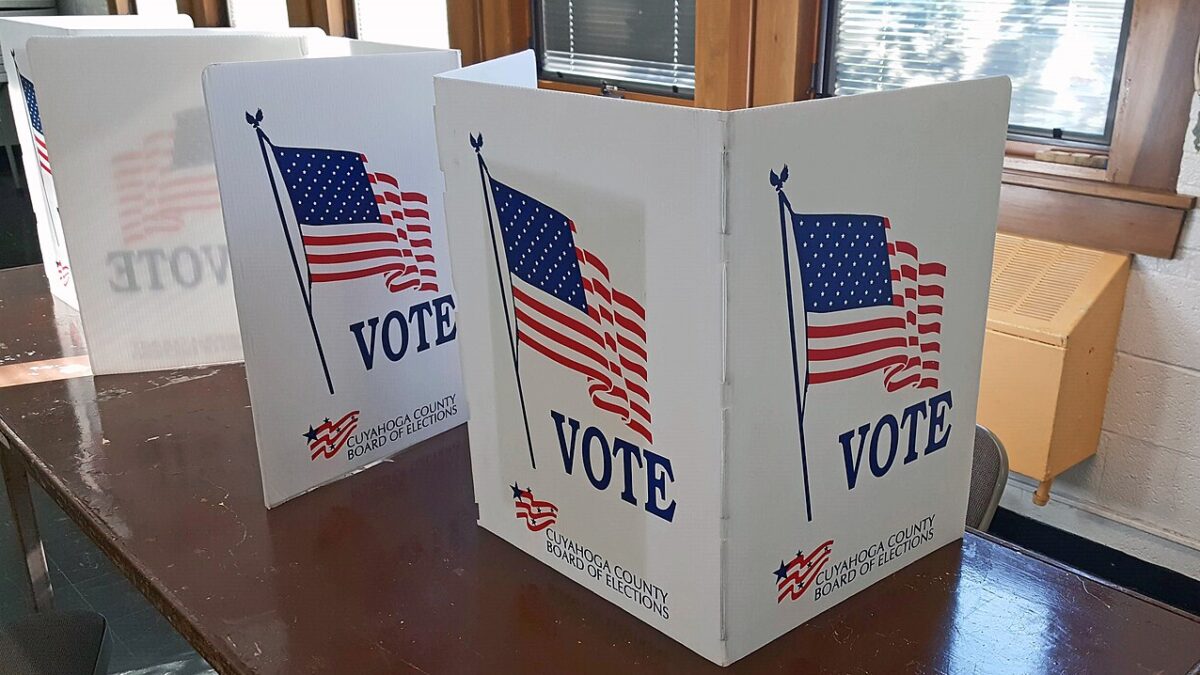
Not only were Russian officials aware of Hillary Clinton’s campaign plan to accuse Donald Trump of being a Russian asset, top U.S. intelligence authorities knew of Russia’s knowledge of Clinton’s plans, Director of National Intelligence John Ratcliffe disclosed to congressional officials on Tuesday. Before they launched an investigation into whether Trump’s campaign was colluding with Russia, intelligence agencies learned that Russia knew of Clinton’s plans to tarnish Trump with the collusion smear.
At one point, former Central Intelligence Agency (CIA) Director John Brennan personally briefed then-President Barack Obama and other top U.S. national security officials that Russia assessed Hillary Clinton had approved a plan on July 26, 2016, “to vilify Donald Trump by stirring up a scandal claiming interference by Russian security services,” according to Brennan’s handwritten notes.
Fired former FBI Director James Comey and fired former FBI counterintelligence official Peter Strzok were even sent an investigative referral on September 7, 2016, regarding Russia’s alleged knowledge of Clinton’s plans to smear Trump as a treasonous Russian agent, Ratcliffe wrote. Rather than investigate at the time whether Russian intelligence had infiltrated the Clinton operation’s anti-Trump campaign and sowed Russian disinformation within it, the FBI instead used unverified gossip from a suspected Russian agent to obtain federal warrants to spy on the Trump campaign.
There is no evidence the FBI ever investigated the Clinton campaign’s documented use of Russian agents and intelligence assets to interfere in the 2016 U.S. election, raising questions of whether the top federal law enforcement agency may have itself interfered in the election by using its powers to arbitrarily target the campaign of the outgoing administration’s political enemy.
In a letter provided on Tuesday afternoon to Sen. Lindsey Graham, R-S.C., who chairs the Senate Judiciary Committee, Ratcliffe wrote that Russian intelligence officials knew about Clinton’s plan to “stir up a scandal” against Trump by “tying him to Putin and the Russians’ hacking of the Democratic National Committee.”
“In late July 2016, U.S. intelligence agencies obtained insight into Russian intelligence analysis alleging that U.S. Presidential candidate Hillary Clinton had approved a campaign plan to stir up a scandal against U.S. Presidential candidate Donald Trump by tying him to Putin,” Ratcliffe wrote in his summary of U.S. intelligence findings.
On September 7, 2016, U.S. intelligence authorities “forwarded an investigative referral to FBI Director James Comey and Deputy Assistant Director of Counterintelligence Peter Strzok regarding ‘U.S. Presidential candidate Hillary Clinton’s approval of a plan concerning U.S. Presidential candidate Donald Trump and Russian hackers hampering U.S. elections as a means of distracting the public from her use of a private mail server,'” Ratcliffe noted.
Brennan personally briefed President Barack Obama and other top U.S. national security officials about Clinton’s campaign plan and Russian knowledge of it. Just five days after the date on which the Russians believed Clinton had personally authorized the collusion smear against Trump, the FBI formally opened its anti-Trump collusion investigation, codenamed “Crossfire Hurricane.”
That investigation relied heavily on a dossier of anti-Trump allegations compiled by Christopher Steele, a former British intelligence agent. Steele was hired by Fusion GPS, a Democrat opposition research firm that had been hired by the Clinton campaign and the Democratic National Committee (DNC) to manufacture and spread claims that Trump was secretly working on behalf of Putin.
At the time, both Steele and Fusion GPS were simultaneously working on behalf of Oleg Deripaska, a sanctioned Russian oligarch with close ties to Putin. In his infamous dossier, which has been thoroughly discredited and debunked since it was published in early 2017, Steele relied heavily on a single source for the most salacious and explosive allegations against Trump.
Dubbed the dossier’s “Primary Sub-Source,” that individual was responsible for laundering the false claim that Trump had personally hired prostitutes to defile a Moscow Ritz Carlton bed that had previously hosted Obama and his wife, Michelle. The sub-source claimed, without evidence, that Russian intelligence authorities had obtained video of the incident and were using it to blackmail Trump to do Putin’s bidding. No evidence exists that the alleged incident occurred or that video of it exists.
The identity of that sub-source — Russian national Igor Danchenko — was publicly confirmed in late July 2020 after FBI summaries of his conversations with the FBI in early 2017 were declassified and publicly released. According to the FBI summaries, Danchenko claimed that he merely viewed the allegations as drunken gossip and unsubstantiated rumors and never meant for them to be shared as viable intelligence. New documents declassified and provided to Congress last week show that U.S. authorities suspected Danchenko of being deeply connected to Russian intelligence.
In fact, the FBI had previously investigated Danchenko to determine whether he was a formal Russian intelligence agent and had characterized him as a potential threat to national security. According to the declassified summary of previous federal investigations of Danchenko, the federal probe lasted nearly two years and included allegations from Americans who had interacted with Danchenko that he might be a Russian spy. The investigation against Danchenko was eventually closed by the FBI, but only because he had left the country and was presumed to be back on foreign soil in Russia.
Danchenko’s claims against Trump, as retold by Steele in his dossier, were used as a primary basis for federal spy warrants against Carter Page, a former Trump campaign affiliate whom the federal government spied on for a year as part of the FBI’s collusion investigation. The federal spy court that reviews and approved those warrants were never informed that the source of the allegations against Page and Trump was a suspected Russian intelligence agent who had previously been targeted by the FBI.
Ratcliffe wrote that the intelligence community “does not know the accuracy of [Russia’s] allegation or the extent to which the Russian intelligence analysis may reflect exaggeration or fabrication.” However, the Clinton campaign and Democratic National Committee did contract with Fusion GPS for its Steele dossiers, which were disseminated to friendly media outlets and U.S. agencies.
Clinton personally pushed the Russia collusion claims on multiple occasions. Following her surprising defeat, she immediately pivoted to a campaign of blaming Russia for election meddling with Trump’s assistance. Within the last few weeks, Clinton has repeated her claim that Trump stole the election from her with Russia’s help.
While Comey, Strzok, and other Obama-era FBI officials have claimed that the investigation of Trump was legally predicated, U.S. Attorney John Durham, who is investigating the propriety of the entire Crossfire Hurricane operation, has publicly stated, based on evidence he has obtained, that he does not necessarily believe that to be the case.









